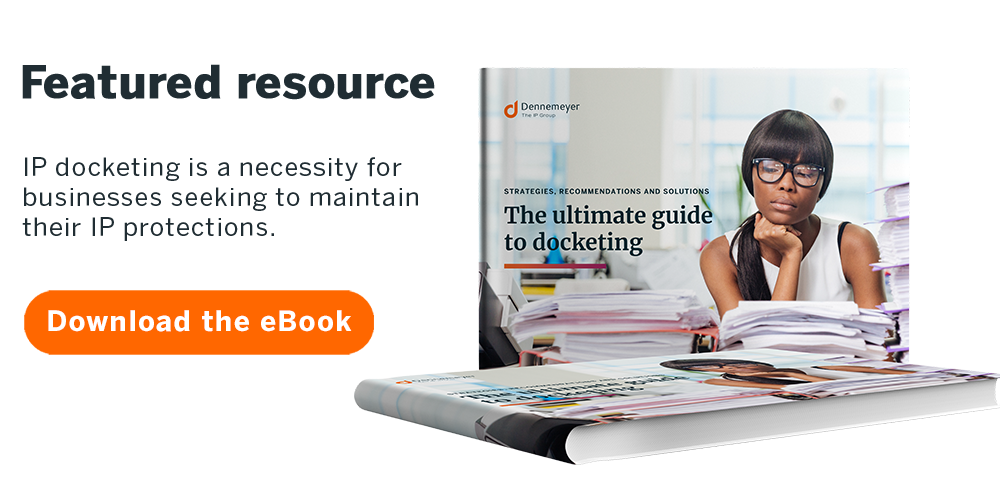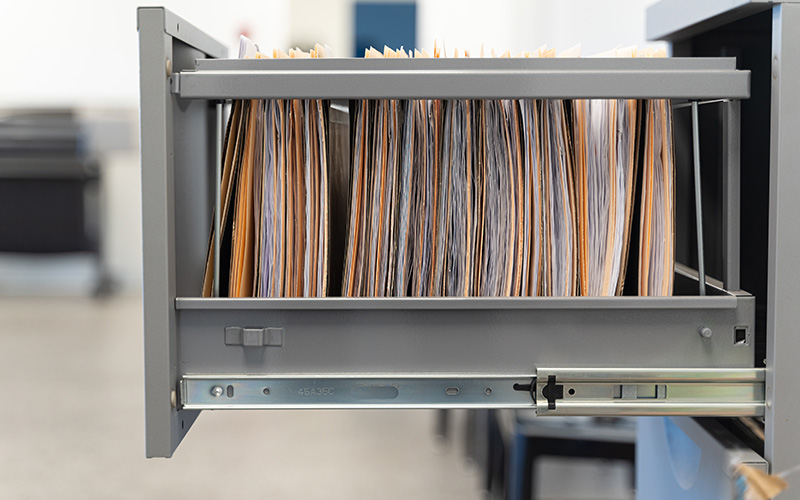
Your comprehensive guide to IP docketing
Intellectual Property (IP) docketing is often, and wrongly, seen as an afterthought. But when you take care of the pennies, the pounds will take care of themselves. Managing essential data, deadlines and documentation from registering offices is crucial for securing IP protection and propping up revenue generation.
Without proper docketing techniques, interested parties run the risk of losing their rights or those of their clients, receiving no payoff for the immense investment of time and money. Here, we share a comprehensive guide to IP docketing to help your company or law firm get the most out of these procedures.

The basics: What is IP docketing?
On the one hand, docketing involves the methodical collection, organization and management of data – essentially the "science" of keeping your IP portfolio in order. On the other hand, it requires a nuanced understanding of laws, office regulations and the individual needs of each IP asset, something which elevates it to an "art."
Together, this practice serves multiple functions essential for enduring asset protection. An effective docketing system minimizes the risk of losing valuable IP rights due to missed deadlines or other administrative oversights. It is also instrumental in handling those deadlines, ensuring that every time-sensitive action or response is completed as required. Beyond that, the system acts as an ongoing audit of your adherence to the law, ensuring that you stay compliant with relevant codes and policies.

At the heart of this multifaceted setup is the docketing specialist – a role that goes far beyond data entry. A docketing specialist has a deep understanding of IP guidelines and is responsible for the heavy lifting of managing complex portfolios and ensuring that nothing is overlooked.
The fundamentals: Dennemeyer's 10 rules
1. Never assume anything
Simply because you have collected all office correspondence and entered the important dates into a docketing software solution does not mean the generated deadlines are correct. Do not assume that a software platform will notify you of the exact date when you have to respond to an office action. Take the time to perform regular reviews.
2. Never close a hard deadline without proof
When handling a large number of IP assets, you might take it for granted that you have met given due dates. It is easy to imagine that your team would have filed a response to a non-final rejection, met an appeal deadline or submitted an application claiming priority. However, without actual proof, this is merely wishful thinking, which is not a recommended strategy for managing your highly valued IP assets.
3. Put your "who, what, when and why" in your docket notes
Too often, inexperienced docketers do not take the time to utilize the notation field in their docketing software. This section is the perfect place to provide your colleagues with context and create a historical marker for a particular IP asset, making cross-referencing other items or situations easier.

4. Do not inactivate a record without explicit client instructions
At one time or another, you may have to decide whether to respond to a deadline for an IP asset that your company or client may want to abandon. Still, it is too risky to make a judgment call based on anything less than a clear directive from the asset owner. Even if you receive a notice of abandonment, make sure that you have an explicit statement from your client or your company's IP manager before you close the record.
5. Keep an open deadline for all active applications
A responsible and sometimes life-saving tactic is always to have deadlines for a portfolio's active applications. Even if you do not have an official due date generated from IP office correspondence, setting an arbitrary status deadline will help to ensure that assets do not fall through the cracks. Consider scheduling a status check action six months from the last record update.
6. Docket from official documents, not internal emails
People make mistakes. Always collect docketing information from official records or correspondence and not from emails or off the back of someone's say-so. It is too easy for errors to seep into such communications. If you do not have the official documents in your possession, request them from an associate or get a copy from the IP office.
7. Double-check your work after updating a record
Remember, human error is not something that only happens to other people. After you have finished docketing a record, give it a quick once-over before moving on to something else. Entering incorrect numbers, dates or actions can have disastrous repercussions.

8. Write accurately and succinctly
Time is money, they say, and nowhere is this more evident than when an attorney is reviewing their docket and wants to know what is going on with a particular case. Docketers, do yourselves a favor and avoid wordy docket entries. Be as concise as possible when writing notes.
9. Help your readers find information fast
Bear in mind that you are not the only one who will read the docket record. Write notes, name documents, docket entries and actions in such a way that leaves no room for guesswork from anyone who wants to glean some information from the record. Be specific and, again, be accurate.
10. Never assume anything!
You might think we are repeating ourselves, but this is a point that cannot be stressed enough: You need proof for every bit of data you enter into your docket. Always double-check data, including that entered by someone else, against official documents. Docketing is a high-stakes game.
Innovate your docketing
Not all IP docketing systems are cut from the same cloth. On one end of the spectrum, you have traditional, manual systems that rely on human intervention. On the other, you find sophisticated, digitalized systems that offer an array of tools designed to streamline the process.
Older approaches may fulfill the minimum requirements, but to safeguard against legal challenges and maintain a competitive advantage, you need to invest in features such as:
- Automated document management: Juggling a bevy of IP-related documents can be challenging. A modern docketing system provides a centralized repository for all your crucial case information, organizing all essential files and enabling you to upload personalized documents and detailed notes.
- Custom reporting capabilities: While basic presentation tools are a standard feature in many docketing systems, the ability to generate customized reports takes it a step further. With the right interfaces, you can conduct in-depth analyses that can be shared internally or with clients.
- Advanced communication features: A truly comprehensive docketing system allows you to send pre-filled emails or letters to update clients and colleagues on the status of filings. Additionally, some systems offer read-only access to those who want an unfiltered view, promoting a sense of transparency and cooperation.
- Efficient client onboarding: The latest docketing systems simplify the onboarding process with automatically generated intake forms. These can typically be customized before being sent out for completion, and once they are returned, the system notifies you of the need for final review.

Trends and challenges
Some additional considerations while carrying out IP docketing or selecting a service include:
- Data security and IP protection: Our vulnerability to cyber threats increases as we generate more digital data. Therefore, adopting a robust data security protocol is imperative. Be it through encryption, multi-factor authentication or advanced firewall protections, ensure that your docketing system prioritizes data security as much as you do.
- Balancing investment risk: IP is an investment, and like any other, it comes with its own set of perils and rewards. Sustainability in IP management means making well-attuned decisions that weigh immediate gains and long-term value. Effective docketing systems assist in monitoring the performance of your IP assets, offering the critical insights you need for strategy development.
- Delivering profitability: A robust docketing system's efficiency and precision can drastically reduce administrative errors and omissions. You can redirect resources toward revenue-generating activities by streamlining operations, avoiding costly blunders and saving time.
IP docketing with Dennemeyer
Many firms are finding it prohibitively expensive to maintain an in-house docketing team with the requisite expertise. Though not directly boosting income, docketing is essential for supporting those processes that do, which is why more firms are choosing to outsource their activities to Dennemeyer. It is like having an expert docketing department right down the hall – without the heavy cost burden. We handle the complexities, freeing your staff from the administrative load of monitoring all-important due dates.
Elevate your operations and choose Dennemeyer for best-in-class service that delivers undeniable value.
Filed in

Discover the importance of Confidential Disclosure Agreements (CDAs) in protecting valuable business assets during licensing negotiations.



